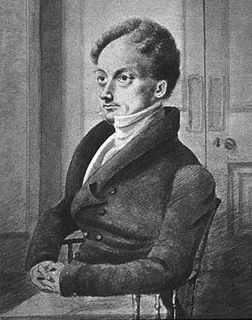A Quote by Saint Augustine
Why is it that man desires to be made sad, beholding doleful and tragical things, which yet himself would by no means suffer?
Related Quotes
Man must learn to believe in that which he does not, at the moment, see in order to grant himself that which he desires to have. Man's prayers are always answered, for he always receives that which he believes. The law that governs prayer is impersonal. Belief is the condition necessary to realize the desire. No amount of pleas or ritual will bring about the fulfillment of your desires other than the belief that you are or have that which you want.
Man is full of desires: he loves only those who can satisfy them all. "This man is a good mathematician," someone will say. But I have no concern for mathematics; he would take me for a proposition. "That one is a good soldier." He would take me for a besieged town. I need, that is to say, a decent man who can accommodate himself to all my desires in a general sort of way.
Anyone who is not totally dead to himself will soon find that he is tempted and overcome by piddling and frivolous things. Whoever is weak in spirit, given to the flesh and inclined to sensual things can, but only with great difficulty, drag himself away from his earthly desires. Therefore he is often gloomy and sad when he is trying to pull himself away from them, and easily gives way to anger should someone attempt to oppose him.
A man vows, and yet will not east away the means of breaking his vow. Is it that he distinctly means to break it? Not at all; but the desires which tend to break it are at work in him dimly, and make their way into his imagination, and relax his muscles in the very moments when he is telling himself over again the reasons for his vow.
Every man has some reminiscences which he would not tell to everyone, but only to his friends. He has others which he would not reveal even to his friends, but only to himself, and that in secret. But finally there are still others which a man is even afraid to tell himself, and every decent man has a considerable number of such things stored away. That is, one can even say that the more decent he is, the greater the number of such things in his mind.
You know, I suffer kind of from survivor's guilt. It's like you suffer from success because you feel like - why me? Why am I so special? What makes me so different from the next man and why am I able to achieve these things that this person can't? Prayer is the only thing that helps me get through it.
Why does man freeze to death trying to reach the North Pole? Why does man drive himself to suffer the steam and heat of the Amazon? Why does he stagger his mind with the mathematics of the sky? Once the question mark has arisen in the human brain the answer must be found, if it takes a hundred years. A thousand years.
[A] process was going on in which people were transformed into things, into pieces of reality which pure science can calculate and technical science can control. … [T]he safety which is guaranteed by well-functioning mechanisms for the technical control of nature, by the refined psychological control of the person, by the rapidly increasing organizational control of society – this safety is bought at a high price: man, for whom all this was invented as a means, becomes a means himself in the service of means.
The regenerate man's desires are rectified; they are set on God himself, and the things above... Before, he saw no beauty in Christ, for which he was to be desired; but now he is all he desires, he is altogether lovely... regenerating grace sets the affections so firmly on God, that the man is disposed, at God's command, to quit his hold of every thing else, in order to keep his hold of Christ... If the stream of our affections were never thus turned, we are, doubtless, going down the stream into the pit.










































